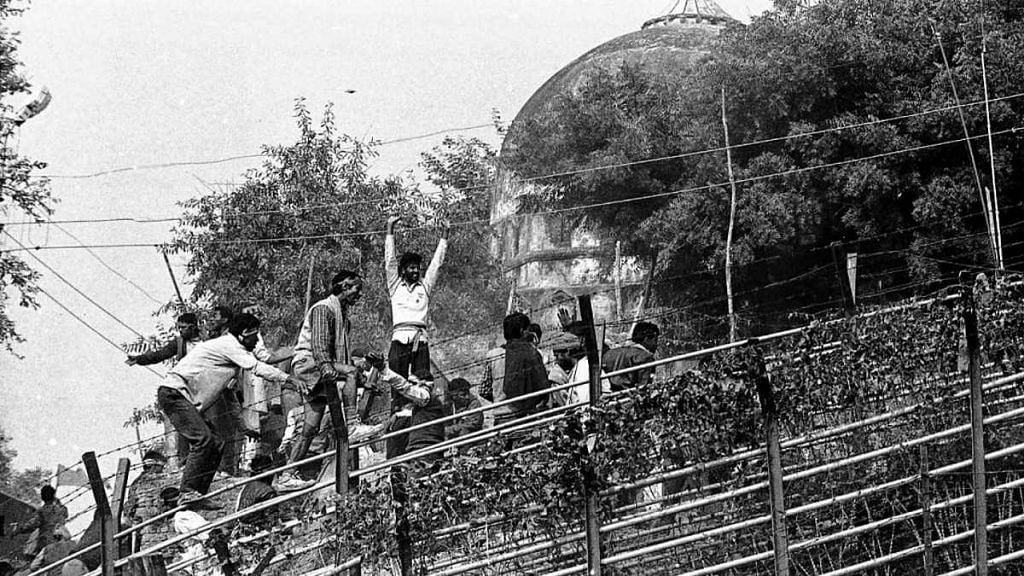Lucknow: A special CBI court in Lucknow Wednesday acquitted all 32 accused in the Babri Masjid demolition case.
Judge S.K. Yadav concluded that despite voluminous evidence and statements, the case didn’t prove that the demolition had been planned ahead, but instead happened all of a sudden.
Among the 32 accused on trial were former deputy prime minister L.K. Advani, former Uttar Pradesh CM Kalyan Singh, and their fellow BJP leaders Murli Manohar Joshi, Uma Bharti, Vinay Katiyar and Sakshi Maharaj.
Judge Yadav noted that newspaper evidence was not acceptable in this case as the original script by reporters could not be proved given that news reports are edited.
Referring to the demolition, the judge said “arajak elements” (anti-social elements) had broken the mosque in the spur of a moment.
He further noted that though over 351 witnesses deposed in the court, their statements were found to be contradictory and incoherent.
As for the video evidence presented by the CBI, it was not reliable since the Code of Criminal Procedure was not followed.
The judgment was pronounced nearly 28 years after the Babri Masjid in Ayodhya was demolished by a mob of kar sevaks on 6 December 1992. The trial in the case had begun nearly 18 years after the incident, and even then, it proceeded at a snail’s pace, leading to the Supreme Court ordering day-to-day hearings on 19 April 2017, and guaranteeing that the judge, S.K. Yadav, would not be transferred.
The criminal case was different to the title suit that was at the heart of the Ram Janmabhoomi-Babri Masjid dispute, and was settled by the Supreme Court in favour of the Hindu parties in November 2019. The top court, however, had noted that the demolition was “an egregious violation of the rule of law”, and held that a wrong committed must be remedied, as it ordered the central government or the UP government to allot 5 acres of land within Ayodhya to the Sunni Central Waqf Board for construction of a mosque.
Also read: Unseen photos of how Babri Masjid demolition was planned and executed in 1992
The long delay
The case and the trial faced myriad delays right from the beginning, when it took months for the UP government to hand over all cases pertaining to the incident to the CBI. The first charge sheet, against 40 persons, was filed in 1993, while a supplementary charge sheet in 1996 alleged a larger conspiracy and a planned attack on the Babri Masjid.
In 1997, when a Lucknow magistrate ordered the framing of charges (including criminal conspiracy) against the accused, whose numbers had now risen to 48, 34 of them moved the Allahabad High Court appealing for revision, and were granted a stay, which is where the case had remained stuck for four years. In 2001, the high court ordered the criminal conspiracy charges be dropped, and the special court in Lucknow bifurcated the case, with around half the accused to be tried in Rae Bareli.
Through more legal wrangling, the Allahabad High Court re-framed the charges of ‘inciting hate’ against Advani and others in 2005, and finally in 2011, on a CBI plea, the Supreme Court combined the two trials together in Lucknow. Review petitions caused further delays, leading to the Supreme Court stepping in in 2017 and bringing Advani and others back into the criminal conspiracy case.
There were over 30,000-40,000 witnesses to the demolition, and oral evidence is said to have played an important role in the trial.
A list of 1,026 witnesses were drawn up, mostly journalists and policemen, and the CBI made extra effort to track witnesses to faraway places like the UK and Myanmar. Eventually, 351 witnesses gave statements in the court. Speeches of the accused leaders, which show that the idea to demolish the mosque was conceived in 1990, were presented as evidence of conspiracy.
Documentary evidence, including news reports, as well as photographs and videos shot at the site on 6 December 1992, were also presented as evidence.
Also read: How India can prevent another Babri Masjid demolition
